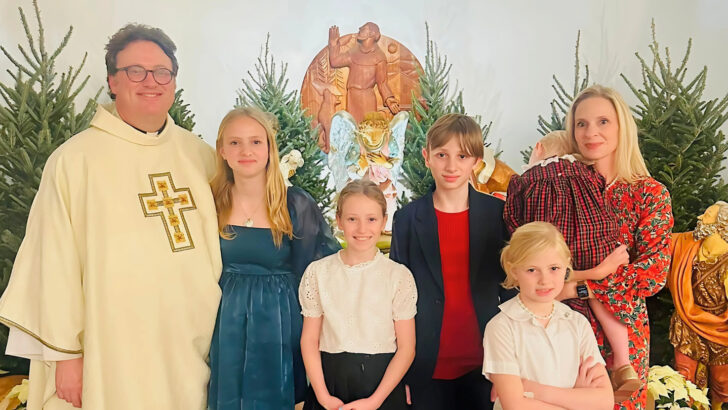In a time when questions surrounding faith, tradition, and ecclesial renewal – a time when debates around women ordination and married priests – echo across the Catholic world, few journeys capture these themes as powerfully as the story of Fr Joshua J. Whitfield, author of The Crisis of Bad Preaching: Redeeming the Heart and Way of the Catholic Preacher. Unlike most Catholic priests, Fr Joshua is married with four children. He and his wife Alli converted to Catholicism in 2009.
Fr Joshua grew up within an Anglo-Catholic context. He went to university knowing that he wanted to be a priest, “as I understood it,” he recalls. His theological exploration led him to West Yorkshire, England, where he studied Anglican theology. After this time, he was ordained as an Episcopal priest back home in America. “I was very fortunate to be around people like Reinhard Hütter, who’s a great convert and Thomist theologian,” he shares, acknowledging that his conversion grew from these discussions and his study of Church history.
Journey
“It was very much a Newman journey, just like many of us who come from Anglicanism discover what Newman discovered – that the real organic Church can’t be substituted by a Protestant reconstruction.” Once he recognised the Catholic Church as “the Church in communion with the successor of Peter,” Fr Joshua knew he had to follow his conscience, even if it meant sacrificing his role as an Anglican priest. “Once you see that, you can’t unsee it,” he said.
After his conversion in 2009, Fr Joshua faced a significant personal and vocational crossroads. He accepted the implications of becoming a layman once again. He took a layman role while discerning his future path. Fr Joshua speaks with gratitude for the Church’s compassion in allowing him to discern a second call to priesthood. “I began the process to discern ordination in the Catholic Church, and that was thanks to the Pastoral Provision of John Paul II.” This Pastoral Provision, established in 1980 by Pope John Paul II, allowed married former Anglican clergy, under special circumstances, to be ordained as Catholic priests without requiring celibacy. This exception serves as a pathway for Anglican clergy who convert to Catholicism to continue their ministry within the Catholic Church, supporting Christian unity while upholding the Catholic tradition of celibate priesthood.
If, for example, my wife was to pass before me, celibacy would automatically impose itself upon me”
“When people look at a priest like me, a married priest, they should think immediately of the Catholic Church’s commitment to Christian unity.” He credits the Pastoral Provision as an effort “for the sake of mending the body of Christ in unity” and is clear that his situation is not one meant to undermine the celibate priesthood. “If, for example, my wife was to pass before me, celibacy would automatically impose itself upon me,” he notes.
Realities
Having served as an Episcopal and a Catholic priest, Fr Joshua offers a comparison that speaks to the realities and challenges of each role. “When I was an Episcopal priest, it was the best part-time job I ever had,” he jokes. “Being a Catholic priest is a far busier thing than being an Episcopal priest.” In his view, the Episcopal Church lacks the numbers and structural vitality present in the Catholic Church. He explains that “the average Sunday attendance at the Anglican church was 68 people,” whereas now he ministers to that many at a 6:25 am weekday Mass.
Fr Joshua’s opinion on the discipline of celibacy is respectful. “Theologically, I would be very cautious about removing celibacy,” he shares. “It plays a very important role in the life of the Church at a spiritual and theological level.” He notes that while celibacy is a matter of Church discipline rather than strict doctrine, it has deep theological roots and a longstanding history within the Church.
The Church couldn’t afford it. A married priest with kids is expensive. Catholics do not give anywhere near the amount of money to make that a viable reality”
For Fr Joshua, the concept of celibacy finds value not in being strict but in its role in the Church’s life and witness. “St Ambrose certainly knew there were married priests in his time,” he reflects, “but he considered them only backward churches. By the time it became canonical, it had already sort of de facto become normative.” Celibacy, he argues, serves as a unique witness, one which contributes to the Church’s call to holiness.
Talking about the practicalities of being a married priest, Fr Joshua mentioned that “If the Church in Ireland, or the Church in general, wanted to open the priesthood to married men. First things first, the Church couldn’t afford it. A married priest with kids is expensive. Catholics do not give anywhere near the amount of money to make that a viable reality.”
Comparing the idea of married priest in the Catholic Church to the reality of the Protestant church he declares that “What would happen is a few institutions or few churches who could afford married priests would probably do so, but my guess is that numbers would plummet… For example, in the Protestant world it has not resulted in increased numbers at all, in fact, the opposite is the case.”
“We can talk about theology and tradition all we want, but the practical matter is that the Church doesn’t have the logistics or the money to make that possible,” Fr Joshua stated.
Discussing contemporary issues like the debates around ordination for women and married priests, Fr Joshua points to what he sees as a deeper misunderstanding of clerical and lay roles. “Only if you have a very distorted view of the Church, generally, would explain the current sort of debates over women deacons. Those debates are sort of twisted by all sorts of clericalism which we have not shaken off.” He speaks out against a “clericalism” that misrepresents the hierarchy, emphasising that “the only sort of valuable hierarchy people should be thinking about is holiness.” He observes that there are lay ministers in his parish who exhibit more holiness than he does, highlighting the importance of recognising the diverse callings within the Church.
Underappreciated
“Lay ministry is underappreciated, that is certain. When we do appreciate lay ministry, we often want to clericalise it because we misunderstand what clergy are. That to be an ordained clergyman somehow better ministry, which is just not true at all,” Fr Joshua expressed when asked about the role of the laity in the Church. “I think it’s legitimate to say that the conversations about ordaining married men to the priesthood or ordaining women to anything is what harms that conversation. It is a fundamental misunderstanding or misappreciation of lay ministry and its relationship to ordained ministry,” he added.
He sees hope in the simplicity of Catholic faith, describing it as a “genius” that resides in its direct connection to Christ and the sacraments”
Fr Joshua’s vision for the future of the Church aims to return to basics, a call to renewal through foundational practices. “If any part of the Catholic Church, in any part of the world, wants renewal, it’s simply going to have to be truly an act of the Holy Spirit,” he declares. Structural changes alone, he argues, will not bring the transformation needed to revive the Church. He sees hope in the simplicity of the Catholic faith, describing it as a “genius” that resides in its direct connection to Christ and the sacraments.
Reflecting
Reflecting on his sense of vocation, Fr Joshua recalls the profound influence that priests had on him as a young man. “My sense of vocation was sparked because around me, as a young man, was a collection of very impressive men who were priests. They were different. And that was attractive to me.” For him, the priesthood is a calling to stand apart – not in self-righteousness, but as a “window into Heaven.”
The role of the priest, in his view, is to inspire this same attraction to holiness within the laity. “The priest should be a person who stands apart, someone you wonder about, asking, ‘What world does this person live in?’” he explains. The priest, he believes, is not simply a leader but a guide, a “sheepdog” leading others to the Good Shepherd.
Fr Joshua’s journey speaks to the challenges and beauty of a life given fully to faith. His story resonates as a call to return to the foundations of Christian life, to embrace tradition while recognising the Church’s ultimate dependence on the Holy Spirit. In a world full of distractions and debates over structural reform, Fr Joshua’s words offer a perspective grounded in simplicity and trust in God’s grace.
“I get very bored when people start asking questions about whether priests should be married or women should be ordained deacons, or about power and structure. I get much more interested when people start talking about Jesus,” Fr Joshua said. His hope for the future is rooted in a return to Jesus and the transformative power of the Gospel – a hope that, for Fr Joshua, is the essence of the Catholic faith.


 Renata Milán Morales
Renata Milán Morales The Whitfield family
The Whitfield family 